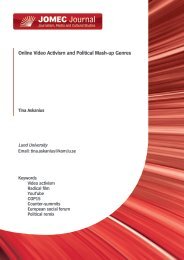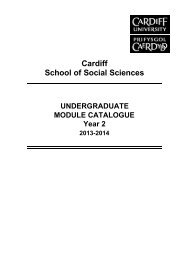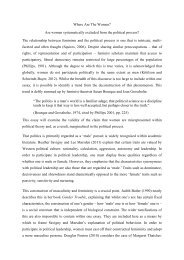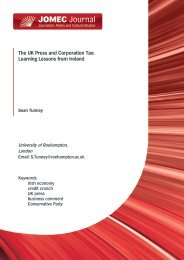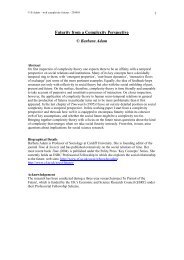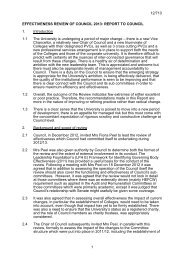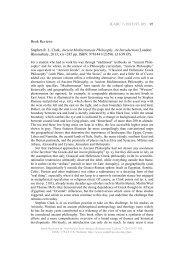APHRODITE IN PROCLUS' THEOLOGY - Cardiff University
APHRODITE IN PROCLUS' THEOLOGY - Cardiff University
APHRODITE IN PROCLUS' THEOLOGY - Cardiff University
Create successful ePaper yourself
Turn your PDF publications into a flip-book with our unique Google optimized e-Paper software.
JLARC 3 (2009) 21-43 26<br />
Demonic Aphrodite<br />
In his Commentary on the Republic Proclus gives an exegesis of the Judgment of<br />
Paris. 22 He uses the alternative mythological name for Paris, Alexander, and sometimes<br />
speaks only of the “barbarian”. His interpretation has both a demonological<br />
and psychological interest. In his view the sheer idea of a real quarrel between the<br />
goddesses is monstrous and should be rejected. There has never been a verdict of<br />
a mortal barbarian on the goddesses. His explanation for the human perceptions of<br />
divine visions is that they concern lower links in the divine chains and that the gods<br />
reveal themselves to the soul’s internal faculty of fantasy, which has its material<br />
part in the so-called pneumatic vehicle of the soul. 23 Denying the historicity of<br />
Paris’ judgment Proclus in this particular case avoids taking a stance concerning<br />
the reality of divine epiphanies. As far as he is concerned the mythologists have<br />
here represented relationships outside space and time as an event in mythological<br />
history.<br />
The core of Paris’ story in Proclus is psychological. Proclus’ exegesis is based<br />
on the doctrine of the modes of the soul’s life as found in Plato’s Phaedrus. When<br />
coming into the world souls choose, under divine supervision, a form of life that<br />
corresponds to their dispositions. A kingly life is dependent on Hera, a philosophical<br />
one on Zeus (represented by Athena in the tale of Paris), a loving one on Aphrodite.<br />
Proclus’ description of Paris’ choice is typically Platonist: A blind soul cannot<br />
recognize its own good. Paris’ choice therefore is “careless, a throwing of oneself<br />
on sensible beauty and pursuing the idol of intelligible beauty.” 24 If he had been in<br />
Paris’ position, Proclus would of course have given the prize to Athena. This would<br />
have been the philosopher’s solution and especially appropriate to Proclus who<br />
has a special relation to this goddess. 25<br />
In Remp. 1. 108, 23-109, 1: ὁ μὲν γὰρ ὄντως ἐρωτικὸς νοῦν καὶ φρόνησιν προστησάμενος<br />
καὶ μετὰ τούτων τό τε ἀληθινὸν κάλλος καὶ τὸ φαινόμενον θεωρῶν οὐχ<br />
ἧσσόν ἐστιν Ἀθηναϊκὸς ἢ Ἀφροδισιακός·ὁ δὲ αὐτὸ καθ’ αὑτὸ μόνον τὸ ἐρωτικὸν<br />
εἶδος ἐπιδιώκων μετὰ πάθους ἀφίσταται μὲν τῶν ἀληθινῶν καλῶν καὶ ἀγαθῶν,<br />
ὑπὸ δὲ ἀνοίας καὶ λαιμαργίας ἐπιπηδᾷ τῷ εἰδώλῳ τοῦ καλοῦ καὶ περὶ τοῦτο κεῖται<br />
πεσών, οὐδὲ τῆς τῷ ἐρωτικῷ συμμέτρου τελειότητος τυχών.<br />
An authentic eroticism, with has taken understanding and wisdom to be its guides,<br />
and can distinguish with aid of these between real and apparent beauty, does not<br />
belong less to Athena than Aphrodite ... But he who pursues exclusively and<br />
passionately only the life of love draws himself away from the really beautiful and<br />
22 In Remp. 1.108, 1-109, 7.<br />
23 For the theory of epiphany see In Remp. 1. 39, 1-40, 3.<br />
24 In Remp. 1. 108, 20-22.<br />
25 Marinus tells us that Athena moved to live with Proclus after her statue was removed from<br />
the Parthenon, Marinus, Vita Procli 30, see also 6 ,9 ,15, and 29.<br />
Tuomo Lankila, ‘Aphrodite in Proclus’ Theology,’ in: Journal for Late Antique Religion and<br />
Culture 3 (2009) 21-43; ISSN: 1754-517X; Website: http://www.cardiff.ac.uk/clarc/jlarc




